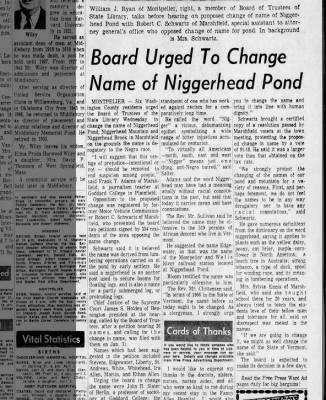LETTERS
Is ‘squaw’ really an offensive name and to whom?
I noticed the common practice of stating with authority “what Native Americans think” or “what Native Americans find offensive.” Native Americans are no more a monolith than Caucasians or other races.
BY
LETTER TO THE EDITOR
POSTED ON
FEBRUARY 1, 2022
To the editor:
In your article, “
Selectboard to consider name change for ‘offensive’ Squaw Peak Road,” reference was made to a press release where U.S. Secretary of the Interior Deb Haaland said, “The term [“squaw”] has historically been used as an offensive ethnic, racial, and sexist slur, particularly for Indigenous women.” You would think this would be a good point in Haaland’s press release to identify the term’s use in an offensive context, since its use as an offensive term is not widely known. The Secretary did not provide examples of “squaw” being used as a racial slur. When others try to show examples of how the word is used offensively, the examples seem extremely isolated and contrived. In my entire life, I have never heard the word “squaw” used in an intended offensive manner, as generally accepted racial epithets are. It is highly probable that you, the reader, have similarly not witnessed “squaw” being used as an epithet in everyday life.
As someone who knows a considerable number of Native Americans — far more than most people in Berkshire Country — I noticed the common practice of stating with authority “what Native Americans think” or “what Native Americans find offensive.” Native Americans are no more a monolith than Caucasians or other races. I have met many Native Americans who are not offended by the term “Indian” and even brandish T-shirts or hats with such statements as “Indian pride” or other messages including “Indian.”
As to the question, “Is the term ‘squaw’ offensive?,” I have spoken to a close Native American female friend of mine of 100-percent blood who might find the term “squaw” outdated, but not offensive. I wouldn’t say, “I called up my squaw friend the other day,” not so much because it would be offensive, but because it would sound weird. When I was talking about an old legend on the other hand, as I did once in a newspaper column about a man who jumped off Monument Mountain to commit suicide, I made a reference to the legend of the Indian “squaw” that jumped off the mountain. The use of the term “squaw” here seems more fitting, as would “Squaw Peak.” The term is invariably used only in reference to fables or someone who lived a long time ago, and it is in this honorific manner that roughly 650 places on federal lands make reference to “squaw.”
The problem with maintaining that the word “squaw” is a racial epithet, is that unlike literally every other racial epithet in existence, the word was not only created by the very ethnic group it supposedly offends, it is being used in a way that the original ethnic group intended — to refer to a young, Native American woman. Being offended by “squaw” would be akin to being offended by other Native American words such as canoe, lacrosse, moose, or toboggan. These words are used in the way Native Americans intended to use them. In fact, “squaw” is from the Massachusetts Native American tribe. (Massachusetts is one of several Algonquin family languages.)
One Native American electronic newspaper article (“The Word Squaw: Offensive or Not?,” Indian Country Today, March 23, 2017, updated September 13, 2018) concludes, “Most historians and linguists appear to be more supportive of a non-derogatory meaning” despite the fact that “the use of the word is still looked at as offensive to many others.” Ordinarily, I would never reference the race of an author, but I think mentioning the article was written in a Native American newspaper by a Native American author — Vincent Schilling, an Akwesasne Mohawk — should quickly dispense the claim of bias. I encourage everyone who has an interest in this subject to invest five minutes reading Mr. Schilling’s piece.
Debunking another misconception, Indian Country Today reports, “According to Dr. Marge Bruchac, an Abenaki historical consultant, Squaw means the totality of being female and the Algonquin version of the word ‘esqua’ ‘squa’ ‘skwa’ does not translate to a woman’s female anatomy.”
If people want to change the name of their street, have at it. But I think Indian Country’s conclusions are correct about the word “squaw.”
Rinaldo Del Gallo, III
Pittsfield

 www.nationalreview.com
www.nationalreview.com





